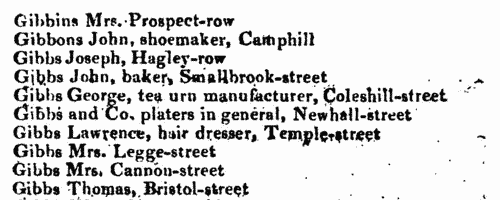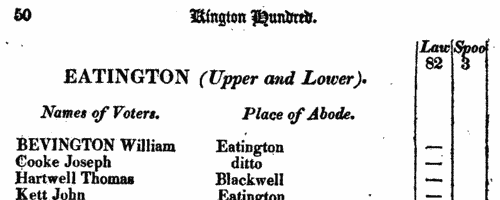Crosbee Surname Ancestry ResultsOur indexes 1000-1999 include entries for the spelling 'crosbee'. In the period you have requested, we have the following 22 records (displaying 1 to 10): Single Surname Subscription | | | Buying all 22 results of this search individually would cost £124.00. But you can have free access to all 22 records for a year, to view, to save and print, for £100. Save £24.00. More... |
These sample scans are from the original record. You will get scans of the full pages or articles where the surname you searched for has been found. Your web browser may prevent the sample windows from opening; in this case please change your browser settings to allow pop-up windows from this site. Wills proved at York: Names of Testators
(1627-1637)
The diocese of York comprised most of Yorkshire, and Nottinghamshire: the York Exchequer court was the ordinary probate jurisdiction for the Yorkshire part of the diocese, but some wills from Nottinghamshire and other parts of the province of York were also proved there. Dr Francis Collins compiled this index to the transcribed wills of the Prerogative and Exchequer Courts in the York registry proved from 1627 to 1637. The date on the left is that of probate; the testator's full name is then given (surname first), parish or place of abode, and sometimes occupation, and date that the will was executed; and volume and folio number where it the transcript commences. The Act Books were used by Dr Collins to supply deficiencies in the information from the transcripts.CROSBEE. Cost: £2.00.  | Sample scan, click to enlarge

| Allegations for marriages in southern England
(1669-1679)
The province or archbishopric of Canterbury covered all England and Wales except for the northern counties in the four dioceses of the archbishopric of York (York, Durham, Chester and Carlisle). Marriage licences were generally issued by the local dioceses, but above them was the jurisdiction of the archbishop, exercised through his vicar-general. Where the prospective bride and groom were from different dioceses it would be expected that they obtain a licence from the archbishop; in practice, the archbishop residing at Lambeth, and the actual offices of the province being in London, which was itself split into myriad ecclesiastical jurisdictions, and spilled into adjoining dioceses, this facility was particularly resorted to by couples from London and the home counties, although there are quite a few entries referring to parties from further afield. The abstracts of the allegations given here usually state name, address (street in London, or parish), age, and condition of bride and groom; and sometimes the name, address and occupation of the friend or relative filing the occupation. Where parental consent was necessary, a mother's or father's name may be given. The ages shown should be treated with caution; ages above 21 tended to be reduced, doubtless for cosmetic reasons; ages under 21 tended to be increased, particularly to avoid requiring parental consent; a simple statement 'aged 21' may merely mean 'of full age' and indicate any age from 21 upwards. These are merely allegations to obtain licences; although nearly all will have resulted in the issuing of the licence, many licences did not then result in marriage. CROSBEE. Cost: £4.00.  | Sample scan, click to enlarge

|  Masters and Apprentices
(1713) Masters and Apprentices
(1713)
Apprenticeship indentures and clerks' articles were subject to a 6d or 12d per pound stamp duty: the registers of the payments usually give the master's trade, address, and occupation, and the apprentice's father's name and address, as well as details of the date and length of the apprenticeship. 1 January to 31 December 1713.CROSBEE. Cost: £8.00.  | Sample scan, click to enlarge

|  Apprentices registered in Scotland
(1741-1745) Apprentices registered in Scotland
(1741-1745)
Apprenticeship indentures and clerks' articles were subject to a 6d or 12d per pound stamp duty: the registers of the payments usually give the master's trade, address, and occupation, and the apprentice's father's name and address, as well as details of the date and length of the apprenticeship. There are central registers for collections of the stamp duty in London, as well as returns from collectors in the provinces and from Scotland. The sums collected are recorded in Scottish money, with conversion to sterling for transfer to London. A Scottish pund was worth 20 English pence. (The sample entry shown on this scan is taken from a Norfolk return)CROSBEE. Cost: £8.00.  | Sample scan, click to enlarge

|  Masters of Apprentices registered at Liverpool in Lancashire
(1741-1745) Masters of Apprentices registered at Liverpool in Lancashire
(1741-1745)
Apprenticeship indentures and clerks' articles were subject to a 6d or 12d per pound stamp duty: the registers of the payments usually give the master's trade, address, and occupation, and the apprentice's father's name and address, as well as details of the date and length of the apprenticeship. There are central registers for collections of the stamp duty in London, as well as returns from collectors in the provinces. These collectors generally received duty just from their own county, but sometimes from further afield. (The sample entry shown on this scan is taken from a Norfolk return)CROSBEE. Cost: £8.00.  | Sample scan, click to enlarge

|  Apprentices registered in Edinburgh
(1767) Apprentices registered in Edinburgh
(1767)
Apprenticeship indentures and clerks' articles were subject to a 6d or 12d per pound stamp duty: the registers of the payments usually give the master's trade, address, and occupation, and the apprentice's name, as well as details of the date and length of the apprenticeship. There are central registers for collections of the stamp duty in London, as well as returns from collectors in the provinces. These collectors generally received duty just from their own county, but sometimes from further afield. The indentures themselves can date from a year or two earlier than this return. (The sample entry shown on this scan is taken from a Salop return. Each entry has two scans, the other being the facing page with the details of the indenture, length of service, and payment of duty.) IR 1/56CROSBEE. Cost: £8.00.  | Sample scan, click to enlarge

| Inhabitants of Birmingham in Warwickshire
(1790-1797)
The provincial sections of the Universal British Directory include lists of gentry and traders from each town and the surrounding countryside, with names of local surgeons, lawyers, postmasters, carriers, &c. (the sample scan here is from the section for Bath). The directory started publication in 1791, but was not completed for some years, and the provincial lists, sent in by local agents, can date back as early as 1790 and as late as 1797.
CROSBEE. Cost: £6.00.  | Sample scan, click to enlarge

| Merchants, Traders and Respectable Inhabitants of Birmingham
(1818)
Wrightson's New Triennial Directory of Birmingham included this 'Alphabetical List of the Merchants, Traders and Respectable Inhabitants of the Town'.CROSBEE. Cost: £4.00.  | Sample scan, click to enlarge

| Freeholders in Birmingham
(1820)
A poll of freeholders of more than 40s per annum of land, to elect a member of parliament for Warwickshire, was held at Warwick 31 October to 7 November 1820. This poll book, listing the voters for each township, parish or borough, was published under the inspection of J. W. Unett, agent for Francis Lawley, one of the candidates, in 1821. In each area the voters are listed by initial letter of surname, with abode (often elsewhere), and whether they voted for Lawley or for his opponent, Richard Spooner.CROSBEE. Cost: £6.00.  | Sample scan, click to enlarge

| Insolvents
(1826)
Insolvency notices for England and Wales: insolvency often caused people to restart their lives elsewhere, so these are an important source for lost linksCROSBEE. Cost: £6.00.  | Sample scan, click to enlarge

|
Research your ancestry, family history, genealogy and one-name study by direct access to original records and archives indexed by surname.
|













